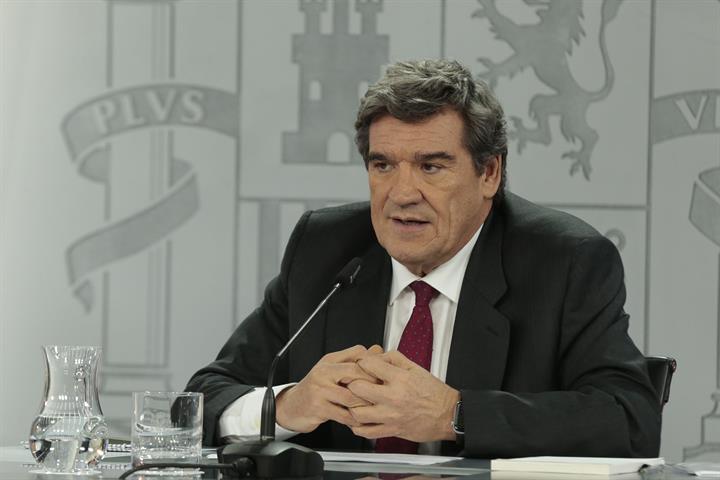Council of Ministers
The Government of Spain reorganises the Justice Administration to speed up procedures
Council of Ministers - 2024.3.12
Moncloa Palace, Madrid
The Council of Ministers has approved the referral to the Spanish Parliament of the Draft Organic Law on measures for the efficiency of the Public Justice Service and collective actions for the protection and defence of the rights and interests of consumers and users.
The Minister for the Presidency, Justice and Parliamentary Relations, Félix Bolaños, has stated that "the Government is determined to carry out the biggest transformation of Justice in decades" for which it is implementing laws, human and material resources as well as economic resources.
The future law on the organisational efficiency of the public justice service is a decisive step towards modernisation and flexibility in the service, as it transforms a 19th century structure into one that meets today's needs.
Félix Bolaños explained the three new features of the regulation: the creation of the Courts of First Instance, which will replace all single-person courts, the establishment of Judicial Offices attached to each Court of First Instance and the implementation of the Justice Offices in municipalities, which will replace the Magistrates' Courts.
The minister specified that the change will be from 3,800 single-person courts to 431 Courts of First Instance, one for each judicial district in Spain. This measure will equalise the workload in all judicial districts and will help judges and magistrates to move proceedings forward more quickly. In addition, the procedural criteria will be common to all of them.
For their part, the Justice Offices extend the powers currently held by the Magistrates' Courts and the services they provide to citizens and guarantee telematic procedural procedures. "We will focus on ensuring that they can access the public service of justice under the same conditions as if they were in big cities, without having to travel to where the Court of First Instance is located," Bolaños remarked.
Dispute resolution
 Minister Félix Bolaños, Minister Pilar Alegría and Minister José Luis Escrivá during the press conference after the Council of Ministers | Pool Moncloa/Borja Puig de la Bellacasa
Minister Félix Bolaños, Minister Pilar Alegría and Minister José Luis Escrivá during the press conference after the Council of Ministers | Pool Moncloa/Borja Puig de la Bellacasa
The future law also regulates alternative dispute resolution mechanisms, i.e. any process of dialogue and negotiation between the parties that avoids litigation. Here, the minister argued, the public justice service will have to deal with fewer legal proceedings, which will make it more streamlined and prevent the collapse of some courts.
Bolaños pointed out that negotiations between the parties is widespread in some areas, such as the social sphere, but it should be extended to the civil and commercial spheres. "We will go for private conciliation, for confidential binding offers, for the opinion of independent experts and we will make it easier for these agreements to be easily transferred to the legal market," he added.
Protection and defence of consumers and users
The regulation establishes a single procedure for dealing with class actions by consumers and users through qualified entities so that they do not have to go to court individually. The minister stressed that this measure is intended to avoid legal proceedings that affect a multitude of people and that are scattered throughout different courts and tribunals.
Moreover, those affected will be able to bring injunctions (to stop conduct that is harmful to them) and actions for damages (to seek compensation) through electronic platforms. In the case of actions for damages, the proceedings will automatically bind all those concerned, without the need for each of them to apply to join the judgment. In addition, a system of electronic dissemination and publicity of these collective actions is created, which is public and free of charge.
Exchange of information on criminal records between Member States of the European Union
The Government has also agreed today to send to Parliament the Draft Organic Law on the exchange of information on criminal records and consideration of judicial decisions of the European Union, thereby transposing an EU directive.
This decision, according to the minister, will favour and speed up judicial cooperation between Member States in the fight against terrorism, organised crime and cross-border crime.
Spain will thereby form part of the electronic system of interconnection of databases of all States where details of criminal records and convictions are exchanged quickly and easily, without the need to process requests that sometimes take months. In addition, Bolaños stressed that it will be possible to access the history and image of people with a criminal record.
The minister announced that the regulation also includes the creation of a register of minors that includes the registration of final sentences and precautionary measures for the custody, defence and protection of minors.
Help for legal aid
Félix Bolaños has also reported on the approval of a royal decree regulating the granting of subsidies for the provision of free legal aid. According to the minister, these subsidies will finance a total of 54.3 million euros for the actions of professionals who have provided free legal aid or psychological care services to victims of crime.
This aid will go to the professional groups of lawyers, solicitors and psychologists, as well as to the Offices for the Care of Victims of Crime. "We are committed to effective judicial protection, but also to a more accessible justice system, in line with the laws we have passed", explained the minister, who stressed that this initiative contributes to "a more accessible justice system that accompanies victims of crime, who are sometimes helpless and in need of psychological care".
These subsidies will apply to 2023 and 2024 with payments to be made through the General Council of Spanish Lawyers (48.3 million euros), the General Council of Spanish Solicitors (5 million euros) and the General Council of Official Associations of Psychologists (1 million euros).
Creation of the largest operator in the telecommunications sector
 The Minister for Digital Transformation and Public Function, José Luis Escrivá, during the press conference after the Council of Ministers | Pool Moncloa/José Manuel Álvarez
The Minister for Digital Transformation and Public Function, José Luis Escrivá, during the press conference after the Council of Ministers | Pool Moncloa/José Manuel Álvarez
The Council of Ministers has authorised the merger of two telecommunications operators, Orange and Más Móvil. The Minister for Digital Transformation and Public Function, José Luis Escrivá, explained that this is a "merger of equals" due to the combination of the Orange and Más Móvil businesses. The resulting operator is the largest in Spain, with more than 30 million mobile customers, more than 7 million broadband users and more than 2 million in terms of TV services.
Escrivá stressed the strategic nature of the telecommunications sector because of its importance for citizens and businesses, because of the opportunities it offers to unpopulated and remote areas, and because it deploys and operates digital infrastructures that are critical for national security. "The competitiveness of a country largely depends on its digital infrastructure and connectivity, and Spain is very well positioned because it has had a lot of public support in recent years in this regard, and we must ensure that this continues to be the case," he said.
The approval of the merger is accompanied by a "truly ambitious" industrial plan, with a medium-term orientation, a "very potent" investment policy for the coming years in fixed and mobile digital infrastructures and, in addition, specific commitments to manage network operations. "In short, we are convinced that, with this merger and the conditions and commitments that come with it, we guarantee better services for citizens in the roll out of fibre and 5G and the future technologies, 5G+ and 6G," he said.
System for controlling access to adult content online
The Council of Ministers has set up the working group to determine the functionalities of the control system to prevent minors accessing adult content.
The Minister for Digital Transformation and Public Function recalled that, given the "extraordinary social alarm" generated by minors accessing pornography online, the president of the Government of Spain is leading a "very ambitious and extensive" national strategy to protect this group.
This strategy, which Pedro Sánchez and José Luis Escrivá discussed with the main operators and platforms last week, relies on technology to verify the age of the person accessing the content. The aim of the working group set up today is to develop just such a technological solution. The Minister for Digital Transformation and Public Function will lead the working group, which will also include the Ministry of Youth and Children and the Ministry of Home Affairs, as well as the Spanish Data Protection Agency and the National Markets and Competition Commission. The Mint, which will be the issuer of the verifiable credentials, will also attend the group's meetings.
José Luis Escrivá pointed out that the control system must meet two fundamental requirements: on one hand, it must ensure privacy and anonymity when age is declared; on the other hand, it must generate sufficient guarantees of authenticity. The technology is being developed at a European level through the Digital Wallet regulated by the European Digital Identity Regulation, which has already been approved by the European Parliament and is now pending approval by the Council of the European Union.
"Spain is leading all the technical work that accompanies the development of this regulation and this will allow us to be pioneers and be able to have this age identification technology very soon," said Escrivá. The minister predicts that age verification will be mandatory before the end of this year for platforms based in Spain, which "are absolutely committed to accompanying this process".
Defending consumer rights
 The Minister for Education, Vocational Training and Sports and Government Spokesperson, Pilar Alegría, during the press conference after the Council of Ministers | Pool Moncloa/José Manuel Álvarez
The Minister for Education, Vocational Training and Sports and Government Spokesperson, Pilar Alegría, during the press conference after the Council of Ministers | Pool Moncloa/José Manuel Álvarez
On World Consumer Rights Day, which is celebrated on 15 March, the Executive has reaffirmed its commitment to defending the rights of consumers - especially vulnerable ones - through an institutional declaration.
The text is committed to equal access to goods and services for all citizens, particularly people with disabilities, and to the promotion of sustainable consumption.
Twentieth anniversary of the 11 March attacks
At the start of the Council of Ministers press conference, the Minister for Education, Vocational Training and Sports and Government Spokesperson, Pilar Alegría, expressed the Executive's affection, respect and remembrance towards the victims of the attacks of 11 March 2004.
"This country does not forget what those days meant, the pain and the shock, but also the solidarity", said Alegría, who added that "the main vaccine against terrorists is the reinforcement of our rule of law", "based on values such as solidarity, tolerance, respect, honesty, justice and truth".
Non official translation






